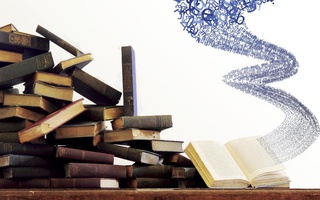The University Library’s new director called on his staff yesterday to embrace the Internet and harness it for the “diffusion of scholarship.”
Robert C. Darnton ’60, who studies the history of books and taught at Princeton before coming to Harvard this year, emphasized that libraries are not “warehouses of printed paper,” but “dynamic cultural centers.”
“We need to...shape the scholarly landscape in flux, and make it happen for the public good,” he said in an appearance before some 200 library personnel at the Graduate School of Education.
Darnton’s speech, “Old Books and E-Books,” came at a semesterly meeting of Harvard library personnel. In an interview before the event, Darnton said that the title of his speech evoked what he hoped to accomplish in his tenure as the University’s head librarian.
“I want to continue to strengthen Harvard’s fabulous collections in old printed material,” Darnton said, “but at the same time I want to help Harvard move into the world of digitized information.”
To show how one could meld the e-book and the “old book,” Darnton told his audience about an electronic book that he plans to write which readers could then customize.
Inspired by an archive in an old Swiss town in which he found—and spent 14 summers reading—50,000 unpublished letters, Darnton said he plans to write about book smuggling across the French border during the 18th century.
The book will be published in electronic form along with monographs and digitized manuscripts so that the reader can create a personal version of the text.
“You can log on and follow things in very great detail depending on how seriously you’re interested,” Darnton said.
Darnton said the book could have several “levels” in which readers could click on additional items according to their degree of interest and have the opportunity to translate excerpts of correspondence and read source material in the original French.
Finally, Darnton envisioned linking printers to binding machines so that readers can print their own hard copy of the book.
Preservation librarian Jan Merrill-Oldham expressed concern about Darnton’s proposal in a question-and-answer session after his speech.
“Things can be confusing” when an original text evolves into “infinite versions,” she said. “Do you think it’s important that we’re not going to be able to point to things easily over the long haul?”
Darnton responded that he would be delighted if there were many different versions of his book, calling the traditional idea of a set copy “an illusion.”
“The notion of the final fixed copy is giving way,” he said. “Texts are always in flux.”
In 2004, Harvard signed an agreement with Google to have the company digitize its holdings of books that are not restricted by copyright.
Darnton said he was enthusiastic about the Google project. But he cautioned that digitization in general, and the rising demand for online resources, is requiring a big investment in time and staff.
Darnton said he expects the Google project to be finished by the end of next year.
—Staff writer Angela A. Sun can be reached at asun@fas.harvard.edu.
Read more in News
Rubin Named Citigroup ChairmanRecommended Articles
-
In Library, New Chapter for Bookish ProfSidney Verba ’53 has joked that prior to becoming Harvard’s chief librarian, he thought of libraries like he thought of
-
From Widener to the World Wide WebBill Gates, the father of the Geek Pantheon, has said that he will not read more than four or five
-
Harvard-Google Online Book Deal at RiskHarvard University Library will not take part in Google’s book scanning project for in-copyright works after finding the terms of
-
Courts Reject Google BooksA district court in New York recently ruled against Google’s proposal to digitize every book ever published, halting a project for which 850,000 of Harvard’s books have already been scanned and challenging the tech giant’s plans to tap into a larger portion of Harvard’s 17 million volumes.
-
 Digitizing Knowledge
Digitizing Knowledge













